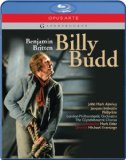| Reviews & Columns |
|
Reviews DVD TV on DVD Blu-ray 4K UHD International DVDs In Theaters Reviews by Studio Video Games Features Collector Series DVDs Easter Egg Database Interviews DVD Talk Radio Feature Articles Columns Anime Talk DVD Savant Horror DVDs The M.O.D. Squad Art House HD Talk Silent DVD
|
DVD Talk Forum |
|
|
| Resources |
|
DVD Price Search Customer Service #'s RCE Info Links |
|
Columns
|
|
|
Billy Budd
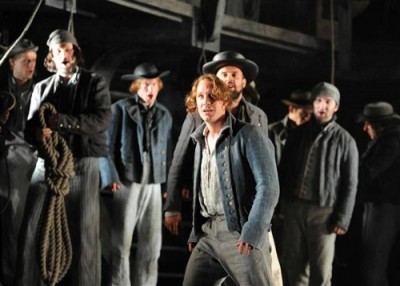
Please Note: The images used here are promotional stills and are not taken from the Blu-ray edition under review.
There are many cinematic points of reference that could be brought to bear on Billy Budd, the 1948 opera (adapted from Herman Melville's novella) by composer Benjamin Britten, novelist/librettist E.M. Forster, and frequent Britten collaborator Eric Crozier. Neither Britten nor Forster have been strangers to movieland; Britten, one of the 20th century's most well-regarded composers, has had his music used in films as diverse as Talk to Her and Love Liza, while many of us were first introduced to Forster's novels through film adaptations (Howards End, Maurice, A Passage to India, etc.). Then there are Peter Ustinov's very good 1962 Billy Budd film with Terence Stamp and Claire Denis's loose, exquisite 1999 adaptation, Beau Travail, the latter of which incorporated music from Britten's opera to memorable effect. But what we have in the current Blu-ray edition , which preserves a lavish 2010 revival of Britten and Forster's for England's Glyndebourne Festival Opera, is much less intertwined with or indebted to the tradition of Billy Budd in the cinema than it is reminiscent of Bergman's 1975 filmed production of Mozart's The Magic Flute. Like Bergman's foray into opera, it finds some fairly ingenious ways to successfully straddle the worlds of the cinema and the stage to create a hybrid opera/film that, while unable to compare to the exhilarations of either live performance or pure cinema, does afford us a unique opportunity to experience a remarkable night at the opera at our leisure and without having to choose between cheap, mediocre seats and prohibitive ticket prices.
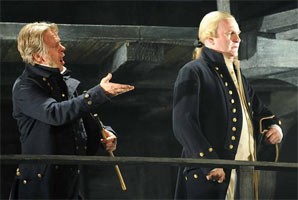
Melville's Billy Budd, its compactness of length and scope allowing it the deceptive simplicity required to attain the highest kind of tragedy, is so resonant that it has become by now an integral work of modern Western mythology. Innocence, purity, and goodness, in the form of young naval conscript Billy Budd (played/sung here by Jacques Imbrailo) proves too disruptive to be tolerated in the violent time (1787) and place (the British vessel HMS Indomitable) in which Billy finds himself as the navy fights England war with France on the maritime front. Well-intentioned, regretful compromise as represented by the ship's master, Captain Vere (the wonderfully affecting John Mark Ainsley) and utter corruption as represented by master-at-arms Claggart (Phillip Ens), are as far as the moral limits reach in this harsh, all-too-real world. The completely guileless, untainted goodness and beauty of the sort possessed by angelic, stammering Billy can only draw the wrath of Claggart (induced in large part by Claggart's obvious, troubling erotic attraction to such a physically and spiritually beautiful man) and the sad regard of Vere, who sees and admires Billy's perfection for what it is at the same time his own responsibility and dedication to the disciplinary exigencies of wartime force him to condemn it. Billy, uncorrupted and incorruptible, must be a quasi-Christ scapegoat for the sullied reality the rest of us live in; his innate, natural adherence to true moral principle is judged a distracting, negative influence in a hierarchy forever on the verge of mutiny and ordered by paranoia and violence, not goodness or decency. The vessel from which Billy Budd came was called The Rights 'o Man, whereas Vere's and Claggart's ship is The Indomitable; that gives us all the clues we need as to what the sides are going to be in Billy Budd's central confrontation, and who is bound, as if by fate, to be the tragic loser.
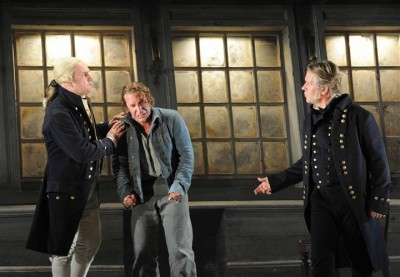
It's the kind of allegorical story that seems conducive to the heightened, operatic pitch it's given by Britten and company, which is, by most widespread contemporary standards of storytelling, rarefied and exaggerated, unrecognizable; it took me a while to succumb to the always-sung but only intermittently straightforwardly melodic dialogue of Billy Budd and settle into the unfamiliar cadences of a mode of expression to which I have been too-infrequently exposed and for which I, like many (I suspect), honestly have very little frame of reference. But once you enter the world of Billy Budd, you find Forster and Britten's serious, elevated sense of tragedy maintained at every moment by the fantastic performers, who ensure your fragile suspension of disbelief for this anti-realistic medium throughout with a fine, delicate power and impressive technical skill, all buoyed by Michael Grandage's energetic direction and an orchestral framework that surges with splendidly controlled power under the hand of conductor Mark Elder.
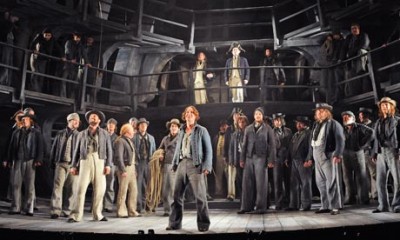
There is, of course, no replicating the live experience through any recorded medium; a static wide shot of the stage could not conceivably work, particularly on smaller screens at home that would only further obscure the details of what's going on up there. The camera has to be taken into the action, and cinematic devices like close-up and montage have to be employed. That's what Bergman was sage enough to do for his admirable Magic Flute film, and television director François Roussilon, charged with creating this version for French and British TV and eventual home-media distribution, wisely follows that example. The framing and cutting techniques used would be rudimentary for a typical narrative feature, but it is just exactly what is called for here, supple and unobtrusive enough to let us enjoy as much of the production and experience as much of the sober, edifying feeling and tragic sensibility as we possibly can without actually being there.
THE BD:
The performance was shot by director of photography Madjid Hakimi on high-def digital video, which tranfers extremely well here (mastered at 1080i, in a 16:9 anamorphic aspect ratio) for a sharp, clear, and vivid picture with virtually no aliasing, noise reduction, or other compression artifacting noted. The only minor instances of image mottling are the couple or so brief moments when the stage goes completely dark; the flaw is quite subtle and alleviated the moment the lights come up. Overall, this is an excellent transfer that lets us enjoy the ingenuity of Christopher Oram's set and the many nuances of Paule Constable's beautiful designed lighting.
Sound:Obviously, sound is of particular importance when it comes to a live recording of a musical production, and this disc offers two superb options: DTS-HD Master Audio or uncompressed PCM. Both are rich, clear, and full as can be--great reproductions of a very well-recorded performance. That said, I slightly preferred the DTS-HD Master Audio option for its more precise and widely dispersed positioning of sounds, but some may lean toward the simultaneity of sound in every channel offered by the PCM, which is arguably truer to a "live" sonic atmosphere.
Extras:"Introducing Billy Budd," a 10-minute, featurette-style montage of interviews, with the principal actors/singers commenting on their characters the development of their performances, and director Michael Grandage speaking about his particular conception of the piece and his sense of obligation to Britten's and Forster's vision. "Designs on Billy Budd" is the same thing from the technical perspective, with Grandate talking about his master plan for the stage set and the use of the venue's space, and set designer Christopher Oram and lighting designer Paule Constable chiming in on their contributions. These brief segments are brisk but fairly informative, and might make for useful primers before dipping your toes into the waters of the main production.
Also included are an interactive on-screen cast gallery and a booklet featuring an essay on the opera with a review of the Glyndebourne production, all written by Peter Reed, as well as a thumbnail synopsis of Billy Budd's action that makes for a nice cheat-sheet for those of us who are newcomers, either to this opera or to the medium in general. Don't let the booklet's thickness fool you; it's the same thing done over in three languages and is significantly shorter than it appears. Which brings up a final note: It's not an extra, but the fact that this is an all-region Blu-ray disc with subtitles in Spanish, German, French, and English (which do come in handy, as precise audibility of lyrics is not opera's primary aim) does increase the generosity of the package, as the disc thereby becomes usable and accessible for that many more people worldwide.
FINAL THOUGHTS:Feature-length filmed performances of works conceived for the stage can be a risky proposition; they rely not only upon the production's going off without a hitch, but also upon an entire complicated technical plan and apparatus being imaginative enough to do justice to the work itself while also operating 100% error-free without a safety net. On those terms, this Blu-ray edition of Benjamin Britten and E.M. Forster's adaptation of Melville's Billy Budd is a smashing success. The piece itself is one of those concentrated, contemplative works that reminds one why there is a distinction for "high" culture; the musical, vocal, and technical interpretations in the 2010 production preserved here are superb; and, as presented in the flattering, sonorous medium of Blu-ray, it looks and (most importantly) sounds magnificent. While it's nothing innovative, cinematically speaking, this presentation is a fine, astutely wrought souvenir of the performance it captures so well--a performance that is in its own right beautifully done, setting a new standard and asserting itself as the definitive rendition of a classic opera. Highly Recommended.
|
| Popular Reviews |
| Sponsored Links |
|
|
| Sponsored Links |
|
|
| Release List | Reviews | Shop | Newsletter | Forum | DVD Giveaways | Blu-Ray | Advertise |
|
Copyright 2024 DVDTalk.com All Rights Reserved. Legal Info, Privacy Policy, Terms of Use,
Manage Preferences,
Your Privacy Choices | |||||||









